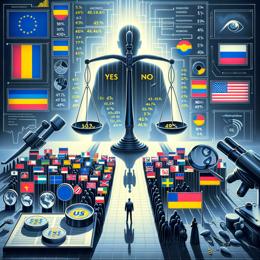Content created by AI
Tensions Escalate as Israel Seeks Control of the Philadelphi Corridor Amid Ongoing Conflict
Amid the raging conflict that has seen the death toll surpass 21,000, Israel's Prime Minister Benjamin Netanyahu has made a contentious declaration about the Philadelphi Corridor, a 14km stretch forming the border between Gaza and Egypt. Netanyahu's stance that the corridor "must be in our hands" could lead to Israel reoccupying Gaza, a move fraught with regional tension and potential international backlash.
The Philadelphi Corridor has been a point of contention since its establishment following the 1979 peace treaty with Egypt. Originally, it served as a buffer zone, halting the flow of arms and the movement of people between Egypt and the Gaza Strip, which was under Israeli occupation. Israel's 2005 withdrawal from Gaza transferred the patrolling responsibility to Egypt and the Palestinian Authority. However, with Hamas gaining control two years later, the dynamics changed, challenging the effectiveness of Egypt's efforts to police the region.
Israel’s current demand for control arises from security concerns, specifically to prevent attacks like the deadly strike by Hamas on October 7 that took a devastating toll on Israeli lives. The insistence on reoccupying the corridor, which includes the crucial Rafah crossing, is not just a strategic move but a potential signal of an intention to regain direct control over the Gaza Strip—a prospect resisted by Egypt, Palestinians, and the international community, including the United States.
The response from various stakeholders speaks volumes about the complexity of the situation. Egypt remains staunchly opposed, with President Abdel Fattah el-Sisi declaring that the displacement of Palestinians into Egypt will not be condoned. The US, too, has rejected any shrinking of Gaza's geographical limits, countering Israel's security aspirations by advocating for the Palestinian Authority to assume control. Analysts suggest Netanyahu’s aggressive pitch could be a multifaceted strategy, aiming to strengthen his domestic support and increasing leverage over negotiations with the US and Egypt.
The implications of Israel reasserting control over the Philadelphi Corridor are considerable. It would change the nature of the Gaza Strip, essentially undoing the steps taken since Israel’s withdrawal in 2005, and deepen the enclave's isolation. Moreover, Egypt's historic opposition to Israeli military presence near its borders and the international community's support for the sovereignty of the Palestinian territories could lead to a significant diplomatic rift.
Furthermore, this move could heighten the cycle of violence, giving rise to increased Palestinian resistance and further undermining the region’s stability. The history of territorial expansion by Israel, as noted by experts, has not granted the security it seeks, and the potential reoccupation of Gaza might only exacerbate the already volatile situation.
Netanyahu's comments also open a conversation about the humanitarian implications for the residents of Gaza. The blockade has turned the area into what is widely referred to as the 'world's largest open-air prison,' and tighter control over its border with Egypt could worsen the living conditions for its inhabitants, intensifying the humanitarian crisis.
The Israeli push to dominate the Philadelphi Corridor is a testament to the enduring complexity and volatility of the Middle East conflict. With the situation evolving, international attention remains fixed on the corridor, an emblematic strip of land at the heart of a protracted and deeply fraught struggle for control, security, and survival.










